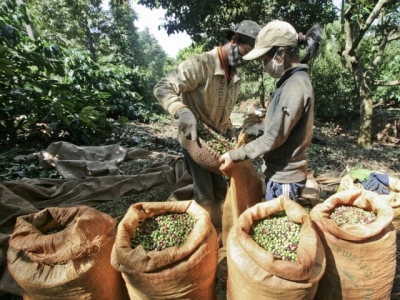Coffee to be restructured for higher quality production

Vietnam will narrow down its coffee plantation areas and focus more on improving coffee product structure in a bid to create high-quality beans with higher productivity.
MARD's new coffee development plan will focus on productivity and quality
The Ministry of Agriculture and Rural Development’s (MARD) Department for Processing and Development of Agricultural Products reported that under MARD’s latest statistics, Vietnam currently has about 662,200 hectares of coffee covering more than 10 provinces nationwide, with total productivity of about 2.6 tonnes per hectare.
However, over the next few years, the area will be reduced to about 600,000ha, with the productivity to be raised to 2.7-3 tonnes per hectare.
“We want to attract more private investments into the coffee sectors, with modern production and processing technology. Thus we can’t develop coffee rampantly. We will have to focus on high-quality coffee products, with stable plantation areas,” said Nguyen Viet Vinh, general secretary of the Vietnam Coffee-Cocoa Association (Vicofa).
Under MARD’s new coffee development plan, raw coffee will be used for exports, with total allowed capacity of one million tonnes per year. It is expected that Vietnam will reap about $2.1-3 billion from exporting this type of coffee over the next few years, which will account for 55-70 per cent of the country’s total coffee export turnover.
Meanwhile, roasted coffee will be used for domestic consumption, with the existing annual capacity of 26,000 tonnes to be increased to 50,000 tonnes by 2020.
Also, instant coffee will be earmarked both for export and domestic consumption. It is expected that the total value from exporting and locally consuming this type of product will hit more than $1 billion by 2030.
At present, Vietnam is the biggest coffee producer in Asia and the world’s second largest one after Brazil, with the total output of more than 1.5 million tonnes per year.
At present, Vietnam is the biggest coffee producer in Asia and the world’s second largest one after Brazil, with the total output of more than 1.5 million tonnes per year. With its coffee area and production, Vietnam is ranked at the fourth in terms of coffee area (after Brazil, Indonesia and Colombia), but at the second in coffee production in general and the biggest Robusta exporter in the world, accounting for 18 per cent of the world’s coffee production.
Coffee is mainly planted in five provinces of the Central Highlands - Dak Lak, Lam Dong, Gia Lai, Dak Nong, and Kon Tum, which all account for over 85 per cent of Vietnam’s total coffee plantation area.
Apart from Robusta coffee with the biggest share of productivity and export turnover of the whole country, Vietnam also has Arabica coffee grown in Lam Dong, Son La and Quang Tri, with total area of about 45,000ha. Coffee of Vietnam is mostly for export. Every year, the country exports around 90 per cent of its coffee output.
Last year Vietnam produced 28.6 million coffee bags, and exported 26.55 million bags, higher than 26.05 million bags in 2016, to earn $3.21 billion.
The country also imported one million bags in 2017, up from 640,000 bags in 2016. It is expected that the figure will be 1.06 million bags this year.
Vietnam’s domestic consumption is expected to increase from 2.32 million bags last year to 2.93 million bags this year due to rapid expansion of coffee shops.
Related news
 Why do farmers use fertilizers?
Why do farmers use fertilizers? Soils naturally contain many nutrients like nitrogen, phosphorous, calcium, and potassium. These nutrients allow plants to grow
 How sustainable is organic food?
How sustainable is organic food? Organic food seems like it should be good for the environment. But not all Norwegian researchers agree it is sustainable.
 Bio-refineries could reduce imports of environmentally harmful soy
Bio-refineries could reduce imports of environmentally harmful soy Farming in Europe is one of the primary causes of the ongoing deforestation in South America as rainforests are cleared to make way for large soy bean plantatio